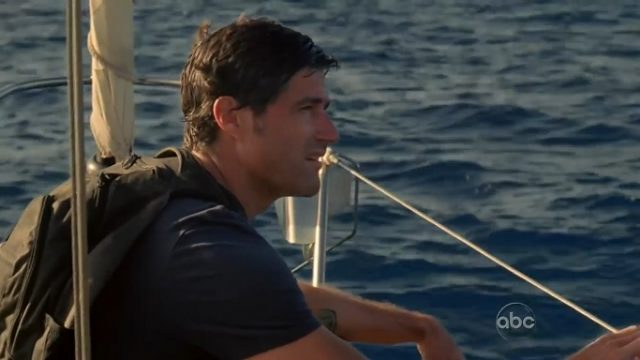This article contains spoilers for the entire run of LOST.
Jack Shepard is a moral relativist. You tell Jack you want to build a raft to get your son off the island, he’ll give you every scrap of wood and every tool and bit of medicine you need; you tell him you need him to push a button every hundred-and-eight minutes for no clear reason other than you desperately want it, he’ll go against every instinct he has and help you. The first three seasons of LOST are a concrete layout of everything good and bad about this philosophy; Jack’s hypercompetence and ability to keep track of everyone’s needs gives him both the skillz and charisma to build a genuine community and keep it running. At the same time, that community repeatedly turns on him – he’s blindsided multiple times by one character or another who chases their individual goal at the expense of the group, with one of the most notable times being the season two finale, where he only realises Michael has tried to sell them all out because Sayid points it out to him.
You can compare him (as the series often does) to John Locke, moral absolutist. Locke’s sense of right and wrong is much more abstract and occasionally alien; Jack has a pretty straightforward sense of ‘this person wants this so I’ll give it to them’, while John believes there’s one right way to live and an infinite number of wrong ways, and that the right way isn’t often clear-cut. Not only does this often lead him down some dead ends, it makes it harder to build a community around him. Most people’s senses of philosophical ambition aren’t as high as John’s, and he often finds himself depressed, frightened and alone.
It’s in season four that the show interrogates the psychological and moral cost of relativity. There are hints of where it’s going in Jack’s oft-maligned backstory: Jack has no faith in his personal morality, and what little personal morality he does have is lifted from his drunk, useless, emotionally distant (and, as of the series premiere, dead) father. Without a moral compass, he’s subject to the whims of people around him; he takes betrayals hysterically poorly, and in season four, when he has every reason to believe his actions have made things worse for everyone and no community to fall back on, he’s as depressed, frightened, and alone as John Locke ever was.
I think a mistake a moral relativist can make – and certainly the one Jack has made – is to treat yourself as above moral concerns entirely, as if you are the only one unburdened by a moral outlook. At minimum, Jack is fundamentally needy, needing people like Hurley or Kate to feed him a moral outlook he genuinely agrees with but can plausibly distance himself from (as if “I am not so arrogant to say right from wrong, I’m helping some friends out”), as well as feeding him praise and comfort for sticking with that outlook. This is an attitude that leaves you at the sway of others (or Others), and can leave you slowly destroying your own soul for the sake of a community.
What we see in the final seasons and especially the last season is Jack treating his own feelings with the same respect he treats others’ (and it’s still in such a Jack-like way; it tickles me that he basically files away how he feels about things so systematically), carefully forging an outlook until he can take up Jacob’s mantle, not because anyone asked him to, not for any clear concrete reason, but because it feels right. Moral absolutists start with their soul and must figure out how to translate that to community; moral relativists start with community and must develop their soul.


